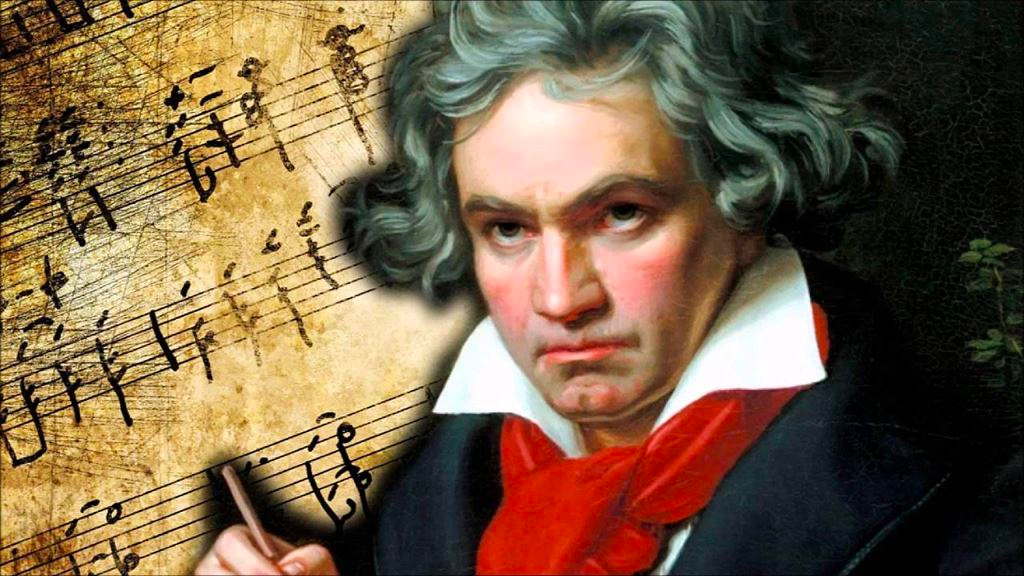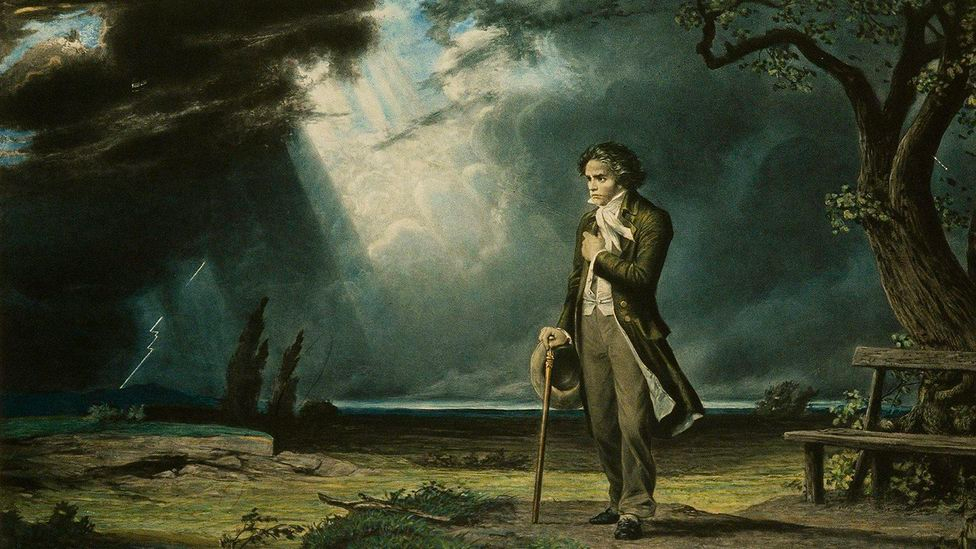Ludwig van Beethoven1770 – 1827
Nature would burst should she attempt to produce nothing save Beethovens.
Robert Schumann (1810-1856)
If you were living in Vienna in 1820 and had met Beethoven, you would have thought that he was very odd. His clothes, his hair, his hat were all messy. He would walk along very energetically, muttering and gesturing to himself, sometimes breaking into a loud lough, for no apparent reason. And then he would stop to sing, grunt or howl some notes, whip a notebook out of his pocket, write something down, and stomp off again.
If he had invited you to his rooms (very unlikely), you would have thought he was even odder! The place was full of sheets of music everywhere, a piano with most of its strings broken and ink spilled inside it, worn-down. Furniture placed higgledy-piggledy, the remains of half-eaten food lying around and much more we don’t want to describe!

Early years
Beethoven was born into a musical family. His grandfather had been music director to the Archbishop-Elector of Cologne, and his father was also employed at the electoral court, though in the lowlier position of singer and instrumentalist. As with the Mozart family, the majority of the seven children born to Johann van Beethoven and his wife died in infancy.
Three boys survived: Ludwig, born on 16 or 17 December 1770, and two younger brothers, Caspar Carl and Nikolaus.
Beethoven’s father Johann, was an alcoholic bully, who was determined that his eldest son should follow in the your Mozart’s footsteps as a child prodigy (although Beethoven didn’t have Mozart’s natural talent).
Johann, unlike Leopold Mozart, lacked abilities as a teacher, and forced his son to practice the keyboard constantly at the expense of his general education. He was even locking him at the basement of the house to practice is he was not satisfied enough with his progress.
From around 1780 Beethoven received more kindly and sympathetic instruction from the court composer and organist Christian Neefe, who organised the publication of his pupil’s first composition.
In 1787 Neefe suggested that Beethoven should travel to Vienna to take lessons from Mozart, who was much impressed with his talent.
Unfortunately his trip had to be postponed because of news about his mother’s illness.
She died of tuberculosis in the summer of that year, leaving him to cope with his father’s violence and alcoholism.
At the age of 18 Beethoven assumed responsibility for the family affairs, being granted half his father’s court salary as well as his own. He also found an influential patron, Count Ferdinand Waldstein, who persuaded the elector to allow Beethoven leave to study with Haydn in Vienna. The elector agreed, and in 1792 Beethoven arrived in Vienna, the city which meant to be his permanent home.


Vienna
On his arrival in Vienna, Beethoven took advantage of introductions provided by Waldstein and Haydn. Musical life still owed much to phenomenally rich patrons, a number of whom were to figure prominently in Beethoven’s life, such as the Lichnowskys, Archduke Rudolph (brother of Emperor Francis), and the Lobdowitz, Browne, Razumovsky and Kindsky families.
Virtuoso performers, such as Beethoven, were much in demand in the drawing rooms.
Beethoven found that his lessons with Haydn were not a great success, but he quickly began to make a name as a pianist, with a formidable reputation for improvisation.
Beethoven gave his first public concert, playing a new piano concert of his own, at the Burgtheater on 29 March 1795, astonishing the audience with his fiery virtuosity and establishing a pattern which would continue for several years.
Over the next four years he went on occasional concerts in Vienna, and issued his chamber works in print, sonatas for piano (including the magnificent Pathetique Sonata No 8 in C minor), violin and cello, and the Op. 16 Quintet for piano and wind.
Nobody knows for certain when Beethoven’s birthday was. His birth was registered on December 17th, which probably means that he was born on the 16 th ; but he might have been born on the 17th – and he himself used to celebrate his birthday on the 15th.
For years, he wasn’t even sure how old he was – partly because his father, to make him seem more of a prodigy than he was, claimed that he’d been born in 1772! It wasn’t until Beethoven was almost forty that he commissioned a friend to find his birth certificate and found out his true age.
His first major orchestral work, the First Symphony, premiered in 1800, and his first set of string quartets was published in 1801. Despite his hearing deteriorating during this period, he continued to conduct, premiering his Third and Fifth Symphonies in 1804 and 1808, respectively. His Violin Concerto appeared in 1806. His last piano concerto (No. 5, Op. 73, known as the Emperor), dedicated to his frequent patron Archduke Rudolf of Austria, was
premiered in 1811, without Beethoven as soloist. He was almost completely deaf by 1814, and he then gave up performing and appearing in public. He described his problems with health and his unfulfilled personal life in two letters, his Heiligenstadt Testament (1802) to his brothers and his unsent love letter to an unknown “Immortal Beloved”(1812).
After 1810, increasingly less socially involved, Beethoven composed many of his most admired works, including later symphonies, mature chamber music and the late piano sonatas. His only opera, Fidelio, first performed in 1805, was revised to its final version in 1814. He composed Missa solemnis between 1819 and 1823 and his final Symphony, No. 9, one of the first examples of a choral symphony, between 1822 and 1824. Written in his last years, his late string quartets, including the Grosse Fuge, of 1825–1826 are among his final achievements. After some months of bedridden illness, he died in 1827. Beethoven’s works remain mainstays of the classical music repertoire.
